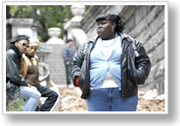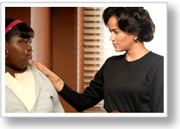


Portrait of a Teen Stricken with Ghastly Parents
Precious is an emotionally-raw film that takes you inside the ghetto of Harlem in 1987 and doesn’t let you out until long after the credits are rolling. Based on the novel Push by Sapphire, this film is one of the best of 2009. It involves the abuse of a 16-year-old, overweight, illiterate teen named Precious. She has the double misfortune of being abused by both parents. Dad sexually assaults her and, as a result, she becomes pregnant with two of his children. Mom despises Precious as she has stolen her man (in her eyes) and does everything in her power to break Precious down. She’s called every disgusting name one can think of, she’s forced to ‘over eat’ meals with a zillion calories, and she is constantly told she is worthless and stupid. The redeeming part of the film is the suggestion of ‘hope’ as Precious does change through the help of a compassionate teacher, new classmates and a probing social worker.
The film itself is powerful with Oscar-worthy performances by four members of the cast: newcomer Gabourey ‘Gabby’ Sidibe as Precious, stand-up comedian Mo’Nique as Mary, her mother, Paula Patton as Ms. Rain, her teacher and Mariah Carey as Mrs. Weiss, her social worker. If you value phenomenal acting, then you’ll appreciate “Precious” as the characters are directed amazingly by Lee Daniels who waltzed Halle Berry to her Academy Award for “Monster’s Ball.” Viewer be warned, these are harsh issues, but important ones as youth in this country and worldwide are living this cruel reality.
*Note- Between every scene Mo’Nique and Gabby made it a habit to hug each other and giggle. During a take that was cut, Mo’Nique is screaming obscenities at Gabby and starts to laugh hysterically as she states “I don’t know what else to call her I’ve run out of bad stuff”. Mo’Nique said in an interview that she knew this character and the pain all too well as she herself was sexually abused by her brother.
Precious is so down-trodden by her horrific conditions that she can barely speak in class. She’s pregnant with her second child by her father, she can’t read or write, she has no friends, and the kids at school bully her. She copes by ‘zoning out.’ When a situation becomes too intense, she pretends to be the star in the spotlight wearing the fabulous dress of a singer that the entire world adores. Daniels uses this technique to ease the viewers’ pain level as well. By adding these sequences of ‘hope’ they serve as a buffer for the revulsion we observe in the film.
Forced to leave public school because of her pregnancy, Precious ends up in a small classroom setting with a nurturing teacher at a school called Each One Teach One. This situation is her savior. As a viewer, you will begin to see a transformation in our heroine as she changes before your very eyes. She speaks in class, has friends and actually begins to read & write. It’s an amazing change as she learns to stand up for herself and seek the help that she desperately needs.
The film does have laughter which shows us the intuitively perceptive side of Precious as she attempts to understand the insaneness of her situation and the injustice of it. She wonders; ‘why don’t I have a boyfriend?’ ‘Why don’t I have a skinny body with good hair?’ ‘Why don’t I have a house with a Mom and Dad that love me instead of hate me?’
The book Push is written in the voice and perspective of Precious. Much of the book contains samples of her journal entries. We read inventive spelling that is translated. The words are powerful and the first person narrative paints a realistic, urgent picture. We find out that her so-called father has another wife and two children. He actually resides with them, instead of with Precious and her mother in the apartment. We read more about her horrific mother and cringe with disgust. We are hopeful by the end as Precious is speaking up in an incest support group and discovering she’s not alone.
Just as “Slumdog Millionaire” brought the horrendous child orphan conditions of Mumbai to the big screen; “Precious” forces us to stare into the face of a teen in this country and ask why. Here’s my question, which situation would you consider worse? A child orphan on the streets of Mumbai or a teen who suffers continual abuse by both parents? It’s a tough call. In conversations with friends, several persons answered: a teen in this country with unbearable parents would be a fate far worse than begging for food and shelter on the streets.
Films do make statements and bring issues to light. They do force us to discuss, question and seek answers. This is a compelling film to be sure, one in which doesn’t leave you for a long time. Push is written by Sapphire, a real teacher who taught reading in Harlem for ten years. These are real circumstances. They do exist. As a country, what do we do about them? A better question would be; as an individual, what can one person do?
*Notes-Gabby has stated in several interviews that there was much love on the set between Mo’Nique and herself as well as laughter.
Sarah Adamson © November 2009
